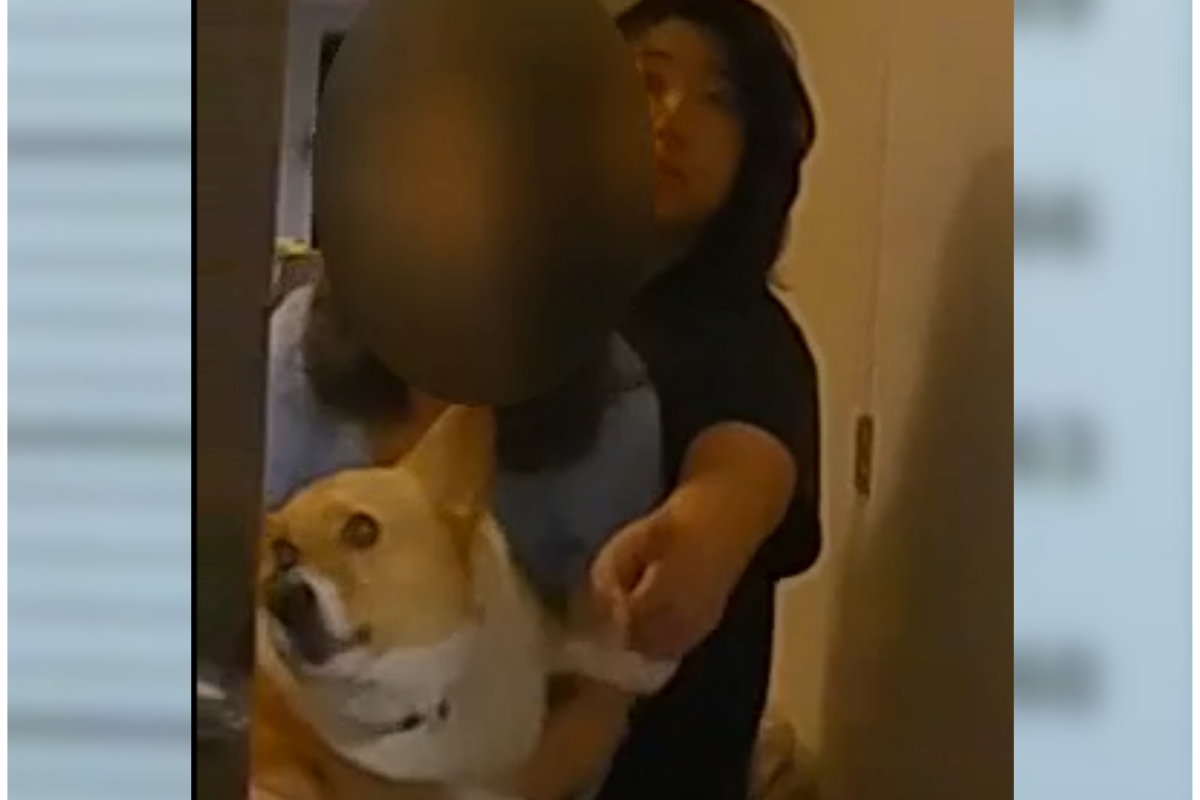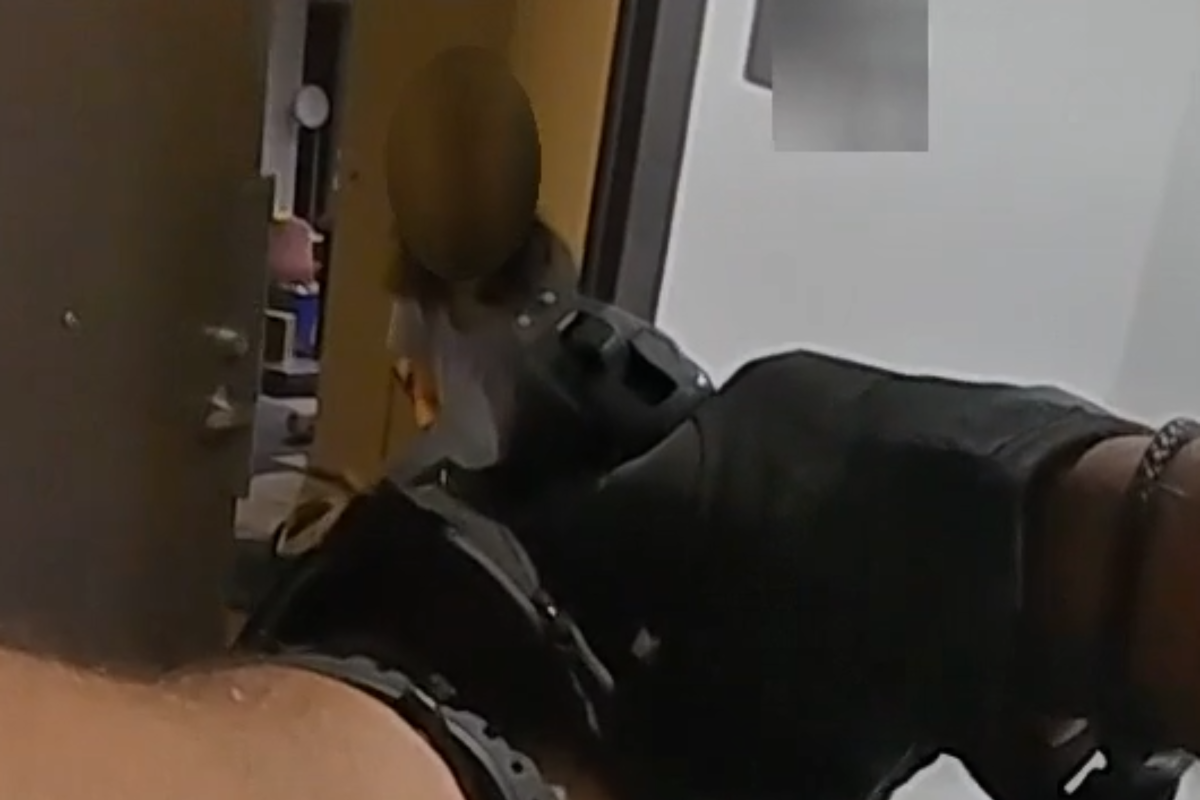It took two minutes and 33 seconds for Fort Lee police to go from not wanting to hurt Victoria Lee to fatally shooting her.
Disturbing body camera footage released by the New Jersey Attorney General’s Office on Friday shows officers responding to the apartment of the 26-year-old woman having a mental health crisis.
Her family, who had called 911, watched as police broke into the apartment and shot Lee who had been threatening to stab them. Her mother stood by Lee’s side as she was shot and their dog can be heard barking in the background.
Immediately after the shot was fired, an officer yelled, “Oh F***! F***!”

Lee’s brother told a dispatcher that he did not want police to come at all, but the video shows a large police response, with at least one officer carrying a shield.
Officers with the Fort Lee Police Department responded to a call from a man who said his sister was experiencing a mental health crisis and needed to go to the hospital at around 1:25 a.m. on July 28, according to a press release from the Attorney General’s Office.
In one of the two released calls to 911 obtained by Newsweek, the man said his sister had a knife, but when police shot Lee she was holding a water bottle.
Body camera video shows an officer speaking to the brother in the hallway of The Pinnacle apartment complex on Main Street.
Two women opened the door to the apartment briefly before closing it again. The officer repeatedly asks them to open the door.

New Jersey Office of the Attorney General
The cops broke down the door and entered the apartment after the women did not comply with their requests.
The Attorney General’s Office said the fatal shot was fired by Police Officer Tony Pickens, Jr.
Pickens was one of the officers who decided to use “lethal” force when officers were discussing how to approach the situation before breaking down the door.
Lee was shot in the chest and officials provided medical assistance. She was taken to Englewood Hospital, where she was pronounced dead at around 1:58 a.m.
A knife was recovered at the scene.
After a responding officer finished interviewing Chris Lee in the hallway, he asked to enter the apartment but Chris Lee did not have a key. The family said the officer pushed Chris Lee aside and “started to forcefully kick the door.”
When officials broke down the door, the family said Lee had already dropped the pocketknife and she was holding a 5-gallon Poland Spring plastic water jug “non-threateningly.”
Pickens then shot Victoria Lee.

New Jersey Office of the Attorney General
They said Victoria Lee suffered from bipolar disorder. She had been attending college but withdrew in 2021 due to her struggles with the disorder.
They called the police response “unnecessarily aggressive.”
“The pain and grief our family is experiencing are beyond words. Victoria was a bright and loving individual with a promising future, and her untimely death has left a void that can never be filled,” the Lee family statement said. “Our family is committed to seeking justice for Victoria and will be working closely with legal representatives to ensure that the full and accurate details of this tragic incident are brought to light.”
There have been five fatal police-involved shootings in New Jersey in 2024 so far, the Attorney General’s Office told Newsweek.
A lawyer for the family did not respond to Newsweek’s repeated requests for comment.
Improving Responses to Mental Health Crises
Newsweek spoke to experts at the forefront of improving support for people experiencing mental health crises.
Dr. Phillip Atiba Solomon, CEO and co-founder of the Center for Policing Equity, said police kill about three people per day on average.
“All of them are tragic,” Solomon said. “The ones that are especially tragic to me, or some of them that are the most tragic are the ones where family reached out for help, someone was dealing with a mental illness, they made it painstakingly clear, ‘hey, here’s what to expect’ and the police still kill that person.”
He said that appears to be the case in the killing of Lee.
“You just look at that and you say there were so many opportunities for that person to still be alive today,” Solomon said.
Asantewaa Boykin, co-founder of the Anti Police-Terror Project, said she was “shocked, but also not shocked because it happens so often.”
“I really just felt for her brother and her mom, because I know there’s a common theme of folks blaming themselves because they didn’t have options [besides] calling the police,” Boykin said.
When law enforcement officials respond to a mental health call, Boykin said they often perceive the person experiencing the emergency as harmful.
“Whether it’s Sonya Massey who has a pot of water or if it’s Victoria who has a water jug when they arrived, they perceive that as a threat and then they respond accordingly.”
Massey, a 36-year-old Black woman, was fatally shot by Sangamon County Sheriff’s Office Deputy Sean Grayson on July 6. She was killed shortly after officials ordered her to move a pot of boiling water off of the stove. Prominent civil rights attorney Ben Crump, who is representing Massey’s family, said she struggled with her mental health.
Solomon explained that police are often authorized to use force on individuals who are not being compliant.
“If you have someone who is in the midst of an acute mental health emergency, it’s going to be very difficult for them to comply,” Solomon said. “And so you end up with someone who’s been given directions, they’re not doing what law enforcement wants them to do and things escalate from there.”
The Center for Policing Equity helps communities explore alternatives to law enforcement when responding to mental health emergencies.
“Law enforcement can never be adequately trained to identify and de-escalate with people with serious mental illness. So if you don’t have somebody there who has that training, you’re at an enormous disadvantage.”
Solomon said New Jersey communities have adopted these alternatives, but Fort Lee has not.
“If they had someone who was trained in mental health response in the lead, you’ve got to believe that you end up with a different kind of outcome,” Solomon said.
Boykin also emphasized the importance of creating and building awareness of resources for those who struggle with mental health.
“We know that police terror happens in these situations where someone is having a mental health crisis and family or friends or bystanders don’t have a choice or aren’t aware of options to help mitigate those crises,” Boykin said. “And I would like to put emphasis on aware, because just about every major city has an alternative of some sort, whether that’s co-response or community-based organization response.”
Co-response policing is when law enforcement responds to mental health calls accompanied by a mental health professional.
Solomon laid out what members of the public can do to help improve resources in their community.
“You can show up to town halls on policing, learn how the police actually function in your city, in your community, and then demand to your local [elected officials], as well as to law enforcement directly, that they implement some of these alternatives to law enforcement,” Solomon said. “You can get engaged in your local political context to make sure that your mayor, city council [and] police commission understands that you’ve got a voice and you’re going to be really loud and in their ear about what you think keeps communities safe.”
Boykin encouraged people to put pressure on their state, county and municipality to enact these other methods of response.
For families who have lost a loved one to police brutality, the Anti Police-Terror Project connects them with resources and support groups.
“When you have that group of folks who have similar experiences, I think it really does empower people to, one, heal and, two, to go do something about it,” Boykin said. “Which is what they’re doing. They’re building legacies around their family members’ stories.”
Solomon urged people not to become discouraged, and said positive progress is being made.
“Every one of these [killings] lands like a boulder, but the ones that don’t die, the places where it’s working, it’s like feathers,” Solomon said. “You don’t know the names of the people who didn’t get killed. So I don’t want people to feel like there’s not hope here. They’ve just got to do a little digging to be able to find it. And it’s hard to weigh feathers against boulders.”
Do you have a story Newsweek should be covering? Do you have any questions about this story? Contact LiveNews@newsweek.com


